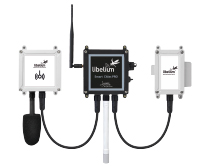Libelium, líder tecnológico en redes de sensores inalámbricas, anuncia la finalización de su Smart Cities plataforma. Una nueva placa de sensores mide la contaminación acústica, la cantidad de polvo, la salud estructural y los niveles de basura.
Esta tarjeta puede combinarse en una red con tarjetas de sensores disponibles anteriormente - para control de gasesdetección de radiaciones y aparcamiento inteligente. Los integradores de sistemas pueden crear ahora una amplia gama de servicios basados en la Smart Cities plataforma.
Los ayuntamientos de hoy se enfrentan a muchos retos que requieren una vigilancia eficaz. La contaminación acústica es un problema medioambiental común que afecta tanto a la calidad de vida como a la salud. Contaminación atmosférica - ya sea en forma de gases como el CO2 y el NO2 o de polvo- es una amenaza para la salud de los habitantes de las ciudades al provocar enfermedades respiratorias. Dado que muchas de las estructuras más grandes, como edificios, puentes y carreteras, están situadas en las ciudades, es necesario garantizar su buen funcionamiento. control de la salud estructural - es fundamental para la seguridad pública.
Por último, pero no por ello menos importante, la gestión del tráfico y los aparcamientos es un reto importante, con la necesidad de minimizar las emisiones y evitar desplazamientos innecesarios. Hasta ahora, algunos de estos retos se han abordado por separado con soluciones verticales independientes; pero los ayuntamientos no pueden permitirse desplegar una red de sensores para cada tipo de problema.
"Las redes de sensores inalámbricos permiten controlar de forma rentable la contaminación acústica, la gestión del tráfico o la salud estructural de las ciudades", afirma Alicia Asín, Directora General de Libelium. Libelium ofrece ahora a los integradores de sistemas una tecnología completa para el control de la contaminación acústica, la gestión del tráfico o la salud estructural. desplegar todos los servicios que necesita una ciudad inteligente utilizando la misma plataforma modular".
La nueva placa de sensores incluye estos sensores:
- Sensores de gas calibrados en fábrica permite calcular el AQI (Índice de calidad del aire) siguiendo las directivas internacionales mundiales que miden CO, NO, NO2, SO2.
- Un sensor de ruido / nivel sonoro se ha diseñado siguiendo las especificaciones del Norma IEC 61672 para sonómetros. Específicamente con un precisión de ±0,5 dBA (1KHz) similar a los dispositivos de tipo Clase 2. Este sensor puede utilizarse para detectar el ruido del tráfico y de las personas y es adecuado para crear un mapa de ruido en tiempo real de una ciudad.
- Un sensor de partículas (polvo) para medir PM1, PM2.4 y PM10 concentraciones. El nuevo sensor de polvo ofrece una precisión adicional al detectar variaciones tan pequeñas como 0,1 ppm en muchos casos.
- Un sensor de grietas para medir grietas en estructuras públicas como edificios y puentes. Puede detectar desplazamientos de hasta 10 micrómetros así como oscilaciones y dilataciones. Este sensor es aplicable a la vigilancia de la salud estructural.
- En sensor de ultrasonidos capaz de medir los niveles de basura en los contenedores. Esto puede permitir servicios de gestión de residuos vaciar la basura sólo de los contenedores que estén suficientemente llenos, ahorrando así tiempo y combustible.
La placa también incluye sensores de temperatura, luz y humedad.
La plataforma Smart Cities permite a los integradores de sistemas desplegar una red heterogénea de sensores inalámbricos con una combinación de placas de sensores para ayuntamientos. La plataforma se basa en la tecnología modular de detección inalámbrica Waspmote de Libelium.
Los integradores de sistemas pueden aprovechar la modularidad de Waspmote y el software de código abierto para crear soluciones a medida para una ciudad concreta. Las motas o nodos de la red se comunican con su pasarela mediante una amplia gama de interfaces de radio, tales como XBee, WiFi, 4G, Sigfox o LoRaWAN. El extraordinario rendimiento de bajo consumo de la plataforma garantiza que Ciudad inteligente tienen requisitos mínimos de batería o pueden funcionar con energía solar.
Libelium ganó el Premio a lo mejor de Sensors Expo en la categoría de adquisición de datos en la Sensors Expo 2011 por su placa de sensores de radiación.
Más información:
- Waspmote: https://www.libelium.com/waspmote
- Placas de sensores: https://www.libelium.com/products/waspmote/sensors
- Aparcamiento inteligente: https://www.libelium.com/smart_parking
- Ciudades inteligentes: https://www.libelium.com/smart_cities
